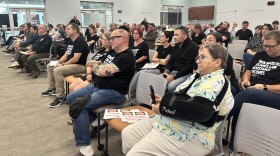After President Trump and many other Republicans warned that vast numbers of non-U.S. citizens would influence last year's election, states and law enforcement have devoted more resources than ever before to root out those ineligible voters.
More than six months into Trump's second term, they haven't found much.
New research out Wednesday tracking state government efforts across the country confirms what election experts have said all along: Noncitizen voting occasionally happens but in minuscule numbers, and not in any coordinated way.
"Noncitizens are not a large threat to our election system currently," said David Becker, the executive director of the Center for Election Innovation & Research (CEIR), which conducted the research. "Even states that are looking everywhere to try to amplify the numbers of noncitizens … when they actually look, they find a surprisingly, shockingly small number."
CEIR spent roughly four months reviewing states' public disclosures about noncitizen voting, stretching back years. The organization shared its findings with NPR exclusively.
The report shows a wide disparity in how states have investigated the issue and what data officials in those states choose to make public. Many states have released no information, even though it's illegal for noncitizens to vote in federal elections and all voting officials do some type of maintenance to their voter rolls.
Some states, such as Michigan and Georgia, have undertaken audits of their entire voter rolls, using resources from the Department of Homeland Security (DHS) to check for noncitizens. Michigan officials announced in April that a review found that "cases of noncitizens casting a ballot in Michigan elections are extremely rare." The review found more than a dozen noncitizens appear to have illegally voted in the 2024 general election. That's 0.00028% of the state's total votes.
"We want to have no evidence of people who aren't eligible voting in our elections," Michigan Secretary of State Jocelyn Benson, a Democrat who's now running for governor, said in an interview after the audit was completed. "But this is a serious issue and it has to be addressed with a scalpel, not a sledgehammer."
Loading...
DHS recently expanded and simplified the tool the agency offers states for those sorts of citizenship checks, so it's likely more states will perform similar audits in the future, though questions remain about how accurate the tool's new features are when it comes to citizenship verification.
Many conservatives say expanded security measures are also needed since one noncitizen vote is too many. But the CEIR report also details how officials in numerous Republican-controlled states last summer leaned into the sort of baseless narratives that Trump and Elon Musk were pushing about noncitizen voting by releasing inflated numbers of "potential" noncitizen voters.
In each case, Becker said, "you start seeing as they proceed and as we get past the political season — as the candidate that they supported gets elected — the numbers go down."
In Texas, "1,930 potential noncitizen" voters last summer turned this year into investigations into more than 100 potential noncitizen voters.
In Alabama last August, the secretary of state removed more than 3,000 supposed noncitizens from the state's rolls, only to be ordered by a judge to stop that program when thousands of those people were found to be U.S. citizens.
"The vast majority of allegations of noncitizen registration or voting appear to arise from misunderstandings, mischaracterizations, or outright fabrications about complex voter data," the CEIR report finds.
The report also noted that 18 states, which span the political spectrum, have not publicly disclosed finding or removing any noncitizen voters on their rolls.
No state has found any coordinated effort to get noncitizens to vote in the 2024 election.
When UCLA election law professor Rick Hasen was presented with the CEIR findings, he said he wasn't "surprised in the slightest."
"It really is not a big problem, both because on the individual level, it would be hard to get noncitizens to agree to it," Hasen said. "And on the broader level, it's just not a very cost-effective way to try to steal an election."
Election officials note there are safeguards to prevent noncitizens from registering to vote, but the biggest deterrent is the fact that immigrants without legal status generally don't want to risk deportation to cast one ballot — especially because the inherent paper trail of voting makes it very easy to get caught.
Separate research has found that when noncitizens do register to vote, it's often due to bureaucratic errors or a misunderstanding about eligibility, as opposed to intentional fraud.
Still, the noncitizen voting myth has persisted for more than 100 years in American elections. Hasen expects it to come up again in 2026, even if states don't find any data to support it.
"Most people who make claims that noncitizen voting is a big problem are doing so for political purposes," Hasen said. "It's a way of demonizing immigrants. It's a way of trying to claim that Democrats cheat. And no amount of evidence is going to stop people from making politically expedient claims."
Copyright 2025 NPR








